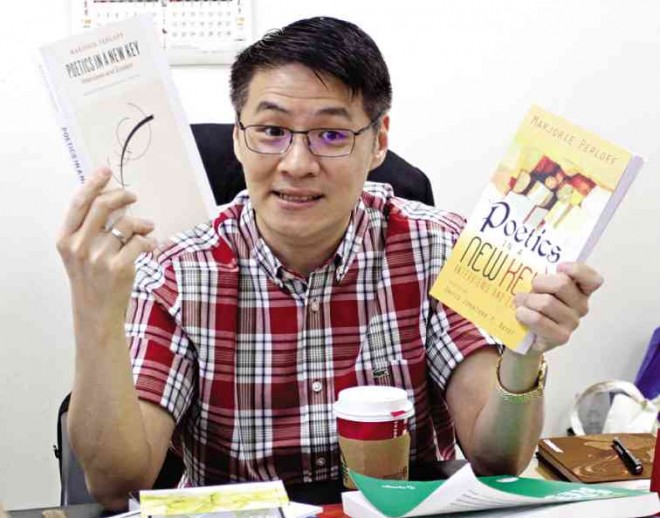David Jonathan Y. Bayot has big dreams for his three-person operation at the De La Salle University Publishing House (DLSUPH).
As executive publisher, Bayot hopes to turn DLSU’s modest publishing office into a sustainable world-class enterprise that will make the university and the Philippines known in the academic book publishing business not just locally but in other parts of the world.
The goal may seem overly ambitious considering DLSUPH does not even print its own publications but sends them out to commercial printers for processing.
But following the warm reception for DLSUPH’s first two major projects, “Poetics in a New Key: Interviews and Essays” by Marjorie Perloff and The Asia-Pacific Education Researcher, a DLSU journal now published by Springer that scored highest in terms of impact factor compared to journals in the subject area of Education in the Asia-Pacific, on an international scale, Bayot is optimistic the goal is within reach.
The publishing house has already scored a significant achievement. It has just granted the University of Chicago Press license to publish Perloff’s book.
“It is a first release, not a reprint from an original foreign edition … [W]hile other university presses in the Philippines would get rights for Philippine editions of foreign books, ours is a distinctly different case. We published the book first and a foreign press—in this case, Chicago—got the right from DLSU for the Chicago edition,” Bayot says.
Reconceptualized
DLSUPH was established only in 2012. This may sound strange—that a major university’s publishing arm is so young. But Bayot says the publishing house is a reconstituted, reconceptualized office. Before DLSUPH, La Salle had its own publishing unit complete with printing presses, just like the University of the Philippines, University of Santo Tomas, Ateneo de Manila University and other major academic institutions.
“The former DLSU Press Inc. was an independent business unit and was expected to generate income,” Bayot says. But the cost of maintaining the equipment and facilities was higher than revenues from printing jobs. Hence, the new, leaner DLSUPH.
“The current DLSU Publishing House is an office under the Office of the Vice Chancellor for Research and Innovation and is mandated to enhance the image of DLSU as an intellectual leader in terms of research,” Bayot says. The office gets money from the school for printing costs.
But Bayot says, “Even though it’s made clear to us that the publishing house is not expected to generate income, we’re however encouraged to see ourselves to a certain extent as a business unit in the sense that it should theoretically be self-sustaining—that we attain a break-even level of income to a certain extent, if not completely so. I say ‘not completely so’ because a big part of our publications are donated to various libraries in the country to fulfill its (La Salle’s) educational mission.”
Bayot, who has a doctorate degree and teaches literary theory at DLSU, says the new DLSUPH aims to contribute to achieving the “university’s mission of excellence in research and education by publishing academic and trade books as well as scholarly journals—in both print and electronic editions.”
It hopes to establish itself as “a notable center of knowledge production and dissemination—through book and journal publication—in both the national and international scenes.”
Scholarly works
As part of DLSU, the publishing house, Bayot says, seeks to help accomplish the university’s educational mission by publishing: (1) work by both established and new scholars in the field of Philippine studies, in a variety of genres; (2) specialized and peer-reviewed research that is generally not accommodated for publication due to its circumscribed readership; and (3) journals in a wide range of academic disciplines including education, business and economics, the social sciences and the physical sciences.
He says the publications are undertaken in the spirit of enhancing scholarship, fostering discussions of ideas and encouraging public debate to contribute to making positive change in society.
Despite being attached to DLSU, Bayot says La Sallian authored books will not automatically be published. Like other manuscripts, they have to pass DLSUPH standards.
Publication will be “solely determined by the merits of the manuscript,” Bayot says. He adds that they will not publish textbooks.
Bayot hopes to invite more foreign authors to have first releases of their manuscripts published by DLSUPH.
Bayot says they do not pay the authors but they will get 10 percent of sales.
Copyright remains with the authors, he says, but there is an agreement that DLSUPH will hold publishing rights for five years during which time the author cannot have the book published anywhere without the publishing house’s consent.
For the Chicago printing of Perloff’s book, Bayot says they granted the university worldwide distribution rights. “In exchange, DLSU gets paid for the grant of rights and will be paid royalty based on the sales of the book,” he says.
Bayot initially vets each manuscript for subject and style. Those he considers fit for publication are sent to two reviewers for evaluation.
“Only when the manuscript is recommended for publication by the reviewers will I recommend the book to the University Publications Board for publication,” he says.
However, the Publications Board can still suspend publication for technical or legal reasons.
DLSUPH has one in-house editor for the humanities and a few freelance editors on Filipino and the social sciences. Bayot says his role is more on project conceptualization.
To achieve the goal of self-sufficiency, Bayot says they partner with groups or institutions like Asia-Europe Foundation (AEF) and Unilab Foundation, which have the funds to sponsor the publication of scholarly projects.
These partnerships have led to the publication of “The Health Dimension of Asian Migration to Europe” (sponsored by AEF) and “From Exceptionality to Exceptional: Inclusion of Differently Abled Persons in the Workplace” (sponsored by Unilab Foundation).
Bayot says DLSUPH is also adapting to the digital age and employing the latest technology in the preservation, production and dissemination of its output.
